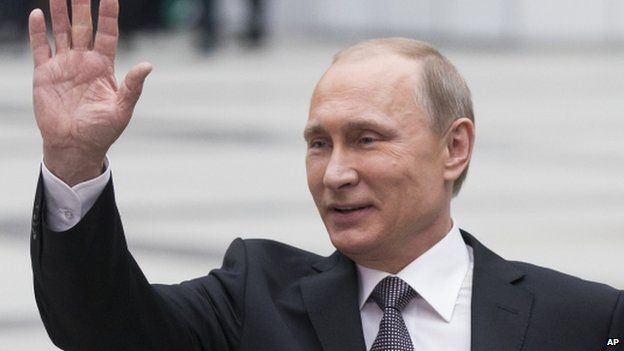Russia sets its sights on Middle East
- Published

Russia's decision to go ahead with the sale of the advanced S-300 surface-to-air missile system to Iran has angered its critics in the West and alarmed the Israeli government in equal measure.
For some it has raised additional question-marks over the fate of any putative nuclear deal between Iran and the international community.
But more significantly it may also mark a renewed effort by Moscow to bolster its diplomatic profile in the Middle East.
The decision to sell the S-300 to Iran is not new, the contract goes back to at least the latter part of 2010.
But for a variety of reasons - concern about Iran's nuclear activities and with intense lobbying from Israel and the West - the Russians never went ahead and delivered the system.
It is not yet clear exactly which version of the S-300 will be sold to Iran.
It is no longer the most sophisticated of Russia's air defences, but it is nonetheless a highly capable system and much better than those the Israelis and Western air forces have faced in the region during recent campaigns.
Nuclear deal fears
Critics argue sophisticated air defences weaken the military threat against Iran, and thus weaken the pressure upon it to make and abide by a final nuclear deal.
Russia's view is this is solely a defensive system delivered to a country in a highly volatile region.
It has delayed delivery for some years, but Iranian concessions in the nuclear negotiations mean the sale can finally go ahead.
Once delivered the S-300 will give Iran an additional outer-tier to its air defences.
But the S-300 is by no means an entirely unknown quantity.
Greece (a Nato member) deploys an early version of the S-300 that was originally sold to Cyprus.
There have been persistent reports Israeli and Western air forces have trained against the system.
There has been much exaggerated commentary on the S-300.
It is no wonder-weapon, but it certainly makes attacking Iran's nuclear infrastructure from the air that much harder, perhaps ruling out a go-it-alone strike by the Israelis.
But what's really behind this S-300 deal?
Putin's motivation
Some see it as an embattled Russian president cocking a snook at the West, though in fairness tensions with Moscow over Ukraine have not damaged concerted efforts to make progress with Iran around the negotiating table.
Others see Vladimir Putin's decision to lift the ban on selling the S-300 to Tehran as signalling a new departure for Moscow's policy in the Middle East.
This is certainly the view of Dmitri Trenin, director of the Carnegie Moscow Centre and a leading analyst of Russian foreign policy.
"As always, the motivation behind the deal is complex," he says.
"A billion dollars in revenue would help, of course, particularly in rough times, but furthering relations with Iran is more important in the long term.
"With its relations with the West badly broken, Russia seeks to consolidate and expand its ties to major non-Western players."
During the years of Washington's active engagement in Iraq, Russia's once-strong role in the Middle East seemed to have been eclipsed: the basic facilities of its naval base at Tartus in Syria almost emblematic of its post-Cold War decline.
But in many ways appearances are deceptive.
Russia had never really gone away and it has seized upon every opportunity in the wake of the failed "Arab spring" to maximise its influence.
Syrian link
No more so than with the government of its long-standing ally Syria, whose President, Bashar al-Assad, is anathema to the West, but not for the Kremlin.
It may not be hugely excited by Mr Assad's behaviour, but as Mr Trenin explains: "Russia's basic calculus regarding Syria and Mr Assad has so far been supported by the developments on the ground over the past four years.
"President Assad is still standing; the secular opposition has not been able to do much.
"Islamic State, is a very powerful factor, but giving in to IS is not an option."
Mr Trenin says the Kremlin is convinced that "its understanding of the region is superior to that of the US and that sticking with one's allies, rather than ditching them, pays off".
Mr Putin, he argues, believes that Russia needs to return to the Middle East, albeit in a wholly different role to that of the Soviet Union.
And the transformation has been significant. "Four years ago," says Mr Trenin, "Russia was present in the Middle East mainly through its beach-going holidaymakers. Now it has an ally [President Assad in Syria] stubbornly and successfully resisting attempts to topple him.
"It is practising mediation on its own [two rounds of Syria reconciliation talks in Moscow], and in Iran it has a regional power as a partner."
In addition, its former ally Egypt is again cosying up to Moscow.
A major arms deal was signed last year; a sure indication of the military government's frustration at its dealings with Washington.
Moscow has also developed a highly pragmatic relationship with the region's other major power, Turkey.
Israeli tensions
The only blot on the landscape is the immediate tensions with Israel prompted by the S-300 deal.
Israel gave up arms deals with Georgia and has hesitated to sell lucrative drones to Ukraine in an effort to win favour with Moscow.
Closer ties with Iran will also frustrate the Saudis and others in the Gulf.
What Russia needs, says Mr Trenin, "is an integrated regional approach which would allow it to avoid dangerous liaisons and unnecessary entanglements".
These are indeed difficult diplomatic waters to navigate, given the many regional rivalries that have only come to the fore as significant parts of the region's political landscape have descended into chaos and blood-letting.